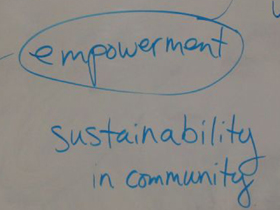CFP: Peer support in diabetes management
Peers for Progress, an organization sponsored by the American Academy of Family Physicians, has released a call for proposals (CFP) to evaluate the benefits of peer support for people with diabetes. Successful proposals will be awarded grants for between $500,000 and $1,000,000.
According to the CFP, eligible applicants include “university-based researchers, health systems, and other organizations with experience and recognizable accomplishments in both (a) diabetes management and/or use of peer-based interventions in health promotion and chronic disease management; and (b) research or program evaluation. Full information about this funding opportunity is available on the Peers for Progress website.
APHA scholarships for community-based organizations
The Community-Based Public Health Caucus of the American Public Health Association is offering a limited number of scholarships to representatives of community-based organizations to defray the costs of travel to the APHA annual meeting in San Diego, CA, October 25-29, 2008. Community representatives who are members of the Caucus or are co-presenting in APHA sessions sponsored by the caucus will be given priority for the scholarships.
Visit the Community-Based Public Health Caucus website for more information about the travel scholarships or to become a member of the Caucus. Members of community-based organizations may be particularly interested in learning more about the National Community-Based Organization Network (NCBON).
Next HEAT Meeting is June 10
The next HEAT meeting will take place on Tuesday, June 10, 5:30 – 7:30 p.m., at the Leroy Collins Public Library (200 W. Call Street) in downtown Tallahassee. We will present a draft vision statement and core principles and discuss plans for a community forum on health equity. We hope for broad participation from people in the community and the universities. Watch this space for further details.
Unnatural Causes
The companion website to the PBS documentary, Unnatural Causes: Is Inequality Making Us Sick?, has many wonderful resources for promoting health equity at a community level.
HUD funding for community development
The US Department of Housing and Urban Development (HUD) has announced FY08 Notices of Funding Availability (NOFAs) for six HUD Office of University Partnership Programs. Three of the programs target support for graduate students and for HBCUs to incorporate community assistance and development into their work. The purpose of the HBCU program, for example, is: “To assist HBCUs to expand their role and effectiveness in addressing community development needs in their localities, including neighborhood revitalization, housing, and economic development, principally for persons of low- and moderate-income, consistent with the purposes of Title I of the Housing and Community Development Act of 1974, as amended.”
The deadline for graduate students is June 12; the other programs have a deadline of July 2. For more information, visit the HUD Office of University Partnership Programs website.
Next HEAT Meeting
The next HEAT meeting will take place on Tuesday, May 13, 5:30 – 7:30, at the LeRoy Collins Leon County Public Library (200 West Park Avenue, at corner of Call and Bronough Streets). The meeting is open to the public. We hope to hear from many different voices as we work to develop a shared vision for how HEAT can promote greater equity in health in Tallahassee and the surrounding region.
Merck Alliance to Reduce Disparities in Diabetes
Merck Company Foundation, the philanthropic arm of Merck Pharmaceuticals, has announced a new initiative to reduce disparities in diabetes care. According to the Merck website, the initiative will commit $15 million over the next five years for evidence-based diabetes programs that will:
- Apply program models that address health care disparities related to type 2 diabetes and its associated conditions or complications among minority, low-income and underserved adult populations
- Enhance patient and health care provider communication, mobilize community partners, and assist health care organizations to decrease disparities in diabetes care
- Improve the quality of health care for adults who have or are at risk for type 2 diabetes
- Decrease health care disparities related to diabetes and its associated conditions or complications
- Increase public awareness of the problem of health care disparities and diabetes
The initiative is seeking applications from “nonprofit organizations, public or private institutions, universities, colleges, health care organizations, community-based or nongovernmental organizations, as well as state and local governments.” Interested organizations should submit a letter of intent, and selected organizations will be invited to submit a full application. See the Merck website for more.
HEAT at the Mayor’s Summit
 Last month, Miaisha Mitchell, Qasimah Boston, and I spoke about HEAT at the Mayor’s Summit on Race, Culture, and Human Relations in Tallahassee. The theme of this year’s summit was “Moving Forward with Positive Change.” Our panel, which also included Dr. José Rodríguez (FSU College of Medicine) and Dr. Makeba Earst (Sunshine State Dental Association), addressed this theme with a focus on how collaboration between community residents and university researchers can generate positive change for equity in health.
Last month, Miaisha Mitchell, Qasimah Boston, and I spoke about HEAT at the Mayor’s Summit on Race, Culture, and Human Relations in Tallahassee. The theme of this year’s summit was “Moving Forward with Positive Change.” Our panel, which also included Dr. José Rodríguez (FSU College of Medicine) and Dr. Makeba Earst (Sunshine State Dental Association), addressed this theme with a focus on how collaboration between community residents and university researchers can generate positive change for equity in health.
The event reminded me of how challenging it is to shift the discussion about health from the doctor’s office and to the community. Many of us are used to thinking about health in terms of health care. Health care is undoubtedly important. But in terms of health equity, it is not the most important factor. The root causes of inequities in health are inequities in social and economic resources. It was exciting to discuss that idea at the Mayor’s summit, because many of the people who attended our panel work in local government in areas that impact public health — even if health isn’t part of their job description.









